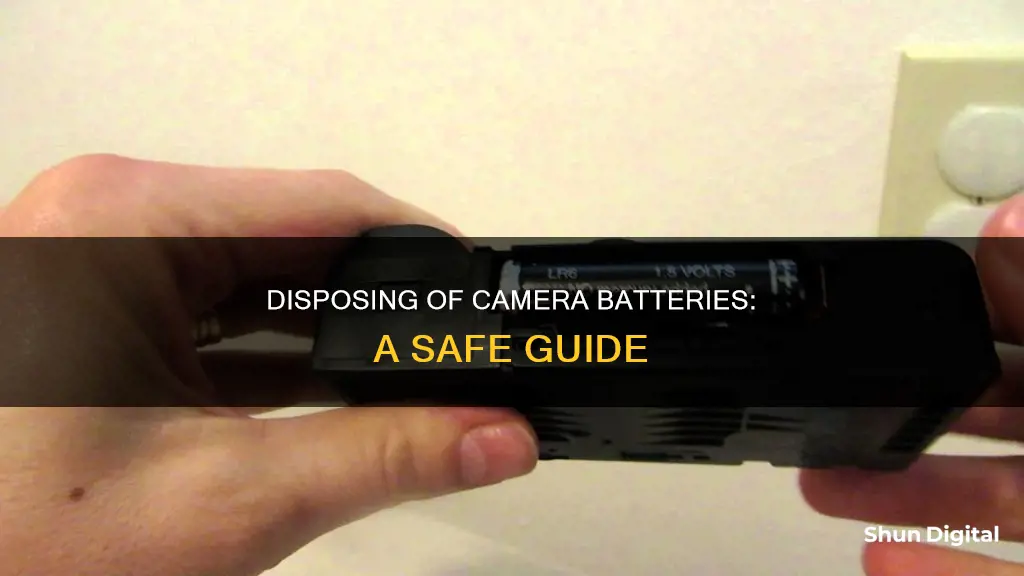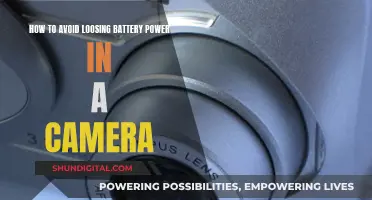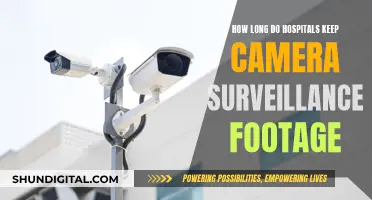
Camera batteries, like all batteries, contain hazardous materials and should be disposed of properly to avoid environmental harm. In this article, we will explore the different ways to dispose of camera batteries safely and responsibly. We will also discuss the potential risks of improper disposal and provide step-by-step instructions for safe disposal methods. By following these guidelines, you can help protect the environment and ensure the safe handling of camera batteries.
| Characteristics | Values |
|---|---|
| Disposal options | Household hazardous waste facility, local electronics retailer, local community center, local library, auto parts retailer, hazardous waste collection site, recycling facility, tape the terminals and put them in the trash |
| Risks if not disposed of properly | Fires, explosions, environmental harm, chemical leaks |
What You'll Learn

Drop off at a local retailer or recycling centre
Dropping off your camera batteries at a local retailer or recycling centre is a convenient option. Many local retailers and recycling centres provide designated drop-off sites for battery recycling. Some offer this service for free, while others may charge a fee, usually based on the type and quantity of batteries you want to drop off.
Before you head to the drop-off site, it's a good idea to call ahead and confirm that they accept the specific type of camera battery you have. You should also ask about any requirements for preparing the batteries, such as sorting them by chemical composition or sealing them in a clear plastic bag.
- Local electronics retailers: Many electronics stores, such as Radio Shack, Staples, Best Buy, or Target, will accept used batteries for recycling.
- Community centres: In some areas, community centres or city halls may also accept batteries for recycling.
- Household Hazardous Waste Facilities: These facilities accept all types of household chemical waste, including batteries.
- Big-box stores: If your camera batteries are still attached to or sealed inside consumer gadgets, you can take them to big-box stores like Best Buy or Staples, which often have programs for recycling old products and batteries.
Charging the Lumix LX5: A Step-by-Step Guide
You may want to see also

Take to a hazardous waste facility
Taking your camera batteries to a hazardous waste facility is a responsible way to dispose of them. These facilities are equipped to handle the safe disposal and recycling of batteries, which can contain hazardous materials such as heavy metals and acids.
Before visiting a hazardous waste facility, it is important to identify the type of camera batteries you have. Different types of batteries have different disposal requirements. For example, rechargeable batteries, which are commonly used in portable electronics, should be recycled and not thrown away. Lithium-ion batteries, often found in cameras, can be recycled at a hazardous waste facility or donated to refurbishers and recyclers. Button cell batteries, on the other hand, are considered hazardous waste due to their mercury content and should only be recycled through specialised local resources.
When disposing of camera batteries at a hazardous waste facility, it is recommended to contact them beforehand to confirm that they accept the specific type of batteries you have. Additionally, inquire about any requirements for preparing the batteries, such as sorting them by chemical composition or sealing them in clear plastic bags. Some facilities may also offer mail-in services for battery disposal, which can be more convenient for those who are homebound or prefer this method.
By taking your camera batteries to a hazardous waste facility, you are not only ensuring their safe disposal but also contributing to a more sustainable future by reducing the need for mining raw materials and protecting the local ecosystem from harmful chemical leaks.
USB Camera Chargers: What's the Deal?
You may want to see also

Dispose of at a local library or community centre
If you're looking to dispose of camera batteries, your local library or community centre may be a good place to start. Many libraries and community centres have battery recycling bins located near the customer service area. This is a convenient and environmentally friendly way to get rid of your old camera batteries.
In the City of Mississauga, for example, you can recycle any rechargeable or single-use batteries at your local library or community centre. This includes common battery sizes such as A, AA, AAA, AAAA, C cell, D cell, 4.5-volt, and 9-volt.
Before dropping off your old camera batteries, be sure to check with your local library or community centre to ensure they accept battery recycling. It's also important to take the necessary safety precautions. For example, it is recommended that you tape the positive and negative ends of 9-volt and rechargeable batteries before placing them in the recycling bin.
By disposing of your camera batteries properly, you're doing your part to reduce electronic waste and protect the environment.
Camera Battery Life: AA Power Explained
You may want to see also

Leave out for pickup
If you're looking to dispose of camera batteries, one option is to leave them out for pickup. Here's what you need to do:
Firstly, check with your local waste management authority to see if they offer household hazardous waste collection services. Some cities and counties have specific drop-off locations or scheduled pickup services for hazardous waste, including batteries. Contact your local government or visit their website to find out the specific procedures and schedules for your area.
If you're unable to find a local hazardous waste program, you can also look for private companies that offer battery recycling services. Some big-box stores, such as Best Buy and Staples, may have battery recycling programs in place and accept batteries for recycling at their retail locations. It's a good idea to call ahead to confirm and understand their specific requirements and procedures.
When preparing your camera batteries for pickup, make sure to handle them with care. If the batteries are rechargeable, it's important to cover their terminals with tape before storing and transporting them. This helps reduce the risk of short circuits and potential fires.
Additionally, separate the batteries by type if possible. Different types of batteries may have specific disposal or recycling requirements. For example, lithium-ion batteries, which are commonly used in cameras, may have separate collection or recycling streams due to their higher risk of causing fires.
Finally, if you have a large number of batteries or are unsure about the specific disposal methods, consider reaching out to your local waste management authority or a battery recycling specialist for guidance. They can provide you with specific instructions and ensure that your camera batteries are disposed of safely and responsibly.
Battery Life of 220 Camera: How Long Does It Last?
You may want to see also

Mail them to a recycling facility
If you're looking to dispose of camera batteries, one option is to mail them to a recycling facility. This is a convenient way to ensure that your batteries are properly recycled and don't end up causing harm to the environment. Here's a step-by-step guide on how to do it:
Step 1: Identify the Type of Battery
Before disposing of any battery, it's important to identify its type. Camera batteries are typically rechargeable batteries, such as lithium-ion or nickel-cadmium batteries. Other types include nickel-metal hydride, nickel-zinc, and small sealed lead batteries. Each type of battery may have specific recycling requirements, so knowing the type will help you choose the right recycling program.
Step 2: Choose a Recycling Program
There are several companies that offer mail-in recycling programs for batteries. Some popular options include Call2Recycle, Cirba Solutions (which acquired Battery Solutions), and Lamp Master Mailback Recycling. These programs provide the necessary materials to safely store and ship your batteries. They also ensure that the recycling process follows federal regulations for hazardous materials.
Step 3: Prepare the Batteries for Shipping
When preparing your batteries for shipping, it's important to follow postal shipping precautions. Cover the battery terminals with tape to prevent short circuits and potential fires during transport. Place the batteries in the provided container or box, following the instructions provided by the recycling program. Make sure to include enough batteries to meet the weight requirements of the program.
Step 4: Ship the Batteries
Once your container is full, follow the return shipping instructions provided by the recycling program. Some programs include return shipping fees in their initial cost, while others may require additional payment. Make sure to use a reliable shipping carrier that can handle hazardous materials safely.
Step 5: Explore Other Options
In addition to mail-in programs, some battery manufacturers and local communities offer battery recycling drop-off events or locations. You can also check with electronics retailers, such as The Home Depot, Lowe's, or Staples, which often have partnerships with battery recycling programs. These options may be more convenient and cost-effective if you have a small number of batteries to recycle.
Remember, recycling batteries is important to protect the environment and ensure the proper disposal of hazardous materials. By following these steps, you can safely and responsibly dispose of your camera batteries through mail-in recycling programs.
Charging Cameras: A Solo Participant's Guide
You may want to see also
Frequently asked questions
Camera batteries are usually lithium-ion batteries. You can dispose of them at a hazardous waste collection site, a recycling facility, or an electronics retailer that recycles batteries.
Improper disposal of camera batteries can cause serious environmental harm as they contain hazardous materials such as heavy metals and acids. It can also lead to fires and explosions.
Keep dead batteries away from children and pets. Store them in a cool, dry place, and tape their terminals to prevent fires.
Some retailers, like Home Depot, RadioShack, and Target, accept batteries for recycling. You can also use online resources like Call2Recycle to find locations near you that accept batteries for recycling.







